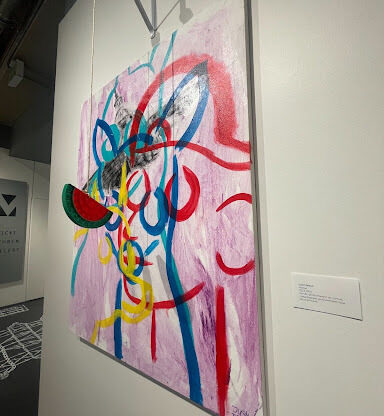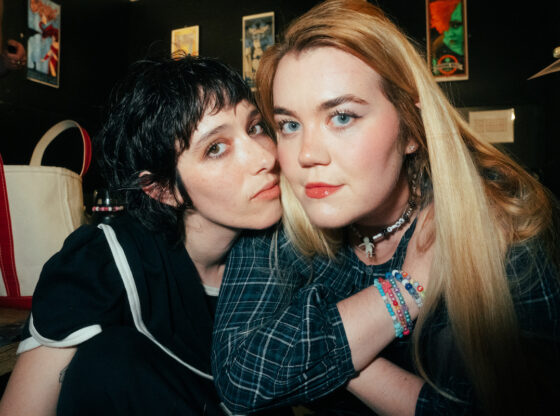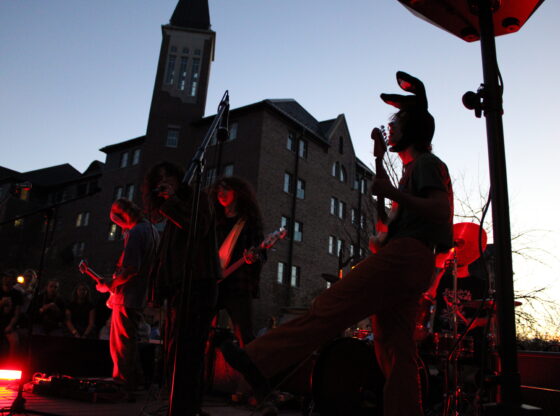Directed by Matthew Plenk, l’Opéra enchanté combined two one-act works by early 20th century French musicians Maurice Ravel to a libretto by the mononymously-known Colette and Francis Poulenc with performances of “L’enfant et les sortileges” (The Child and the Spells), conducted by Lawrence Golan, and “Les Mamelles de Tirésias” (The Breasts of Tiresias) conducted by Sahar Nouri.
Beginning on April 21, the performances spanned four days, including a Sunday matinee to put a wrap on the production. The first half of the show told the fantastical story of L’enfant, a brattish child whose insolence is greeted by a surreal cast of objects and animals, animated and anthropomorphized by the ungrateful child’s tantrum. Graduate vocal major Macy Andrus, who played the main character of L’enfant in the Friday night and Sunday matinee performances, was frantically accosted by arithmetic as numbers from the child’s homework spurred a comedic scene of rapid-fire mathematics splendidly sung by Joan Marquez Unda.
Disheveled and disoriented, Andrus’ character was left in a mathematic stupor as two cats emerged from the scaffolding, which served as the baseline set for both one-acts. Played by Leah Tafoya and Liam Dooley, the cats projected an articulate, operatic “meow,” which—as it echoed within the walls of Gates theatre and despite L’enfante’s allegorical plight—drew a laugh from the Friday night audience.
Thrown once more into ethereal disarray, spindly trees descended upon the stage and the scene transformed into a dimly-lit forest. From the curtains crawled, slinked, and skittered a slew of forest fauna. Costume technician and makeup designer Venus Victrola presented an array of artfully playful characters, from prickly-backed porcupines to bushy-tailed felines. For a moment, a character plodded out on tall stilts with flowing forest-green fabric spilling from all sides only to quickly disappear too soon back behind the curtain. The costumes culminated in the character of Un Arbre, played by Oliver Poveda, whose booming, bassy voice and twig-branch crown were reminiscent of the leafy forest giants that tower hundreds of feet above the children who play within their shade.
The cast surrounded Andrus, whose character’s failed attempt to reconcile with the formerly disrespected creatures led to her frightened cower near the center of the stage as the syncopated cries of each animal developed into a polyrhythmic roar. In the chaos, a squirrel, played by Bailee Herbold, suffers an injury, which L’enfant mends. A reconciliation ensues in the number “Il a pansé la plaie…” (he has bandaged the wound), culminating in the rescue of a wounded Andrus, the animals returning her to “Maman,” played by Bryn Posey, as the youthful dreamscape fades and reality returns.
Though Lawrence Golan conducted the opera during its preparation, he unfortunately received a positive test for COVID-19 mid-rehearsal mere days before opening night. His replacement, Héctor Jardón, received a warm ovation once he graced the stage.
The second one-act, an opera bouffe, was Poulenc’s first opera, an adaptation of his mentor Guillaume Apollinaire’s play of the same name. From its onset, the opera was seated in a quirky, comedic style; Le Directeur, played by visiting baritone, the well-lauded Troy Cook, delivered a Puck-esque address to the audience, in which he encouraged them to heed the opera’s moral and “make children, you who made scarce any.”
Put to a libretto in 1945, Poulenc adapted Apollinaire’s after World War I play to reflect the original farcical themes aimed at repopulation for a post-war France whose weakness during the war was sometimes blamed on a lack of interwar repopulation. The play is based on the Greek myth of Tiresias, who was transformed into a woman by Hera, reversing the gender roles.
In the play, Thérèse, played by Lillian Ridout in the Friday performance, dissatisfied with her “womanly charms,” removes her bosom and begins to grow facial hair. To the delight of the audience, from under her apron, Ridout removed the “breasts” — two balloons, one red and one blue — and popped them with a needle. She then strapped a beard behind her ears and tied up her disgruntled husband, played by Justin Given, and in a robust soprano sang her (his) new nom de guerre: Tirésias.
Poveda, playing Presto, returned to the stage alongside Unda, Lacouf, for a lighthearted number. A drunk Lacouf and Presto argue about the location of the one-act, Paris or Zanzibar, Pouveda’s voice remaining strong despite expertly-stumbled inebriation. The scene ended in simultaneous gunshots as the two killed one another in a duel.
A high point of the opera came in the second half, after Given, left without the faculties of childbirth by his wife’s change-over, develops a way to repopulate Zanzibar on his own by way of “will-power.” Stuffed baby dolls wrapped in a cloth diaper began to fly from behind the stage-right curtain as he sang of the 40,049 children produced in a day. Shocked guffaws swept the audience as many of the thrown dolls arced towards a slapstick collision with the scaffolding’s poles, then fell 15-20 feet onto the hardwood stage.
Many of the children, the audience learns, are well-accomplished and wealthy despite their seeming infantility. Picking up his children off of the scaffolding as they spill over his cradled arms, the husband introduces a renowned actress, a business-wise hoarder, and a novelist whose last book, “A Lady Whose Name was Poop,” sold over 6,000,000 copies.
Below the stage, conducted by Nouri, the orchestra was the hidden star of the one-act. The tone and timbre of Poulenc’s broadly playful and richly stern melodies shone through, coming to a head in the “Intermezzo” number. Mellow horns prepped an upbeat ascending and descending piano pattern accompanied by a joyful, gallivanting string melody.
The chorus added another piece to the strong musical topography of the show. Whiney children sang in unison in a call-and-response with their overwhelmed father of 40,000; deep, listless harmonies lamented the deaths of Lacouf and Presto; and the dramatic final call—“Cher Public, faites des enfants” (Dear audience, go make children)—led one to almost forget the farce.
The next event on the slate for Lamont Opera will be a May 26 workshop including the works by Handel, Russian composers and musical theater numbers. Tickets are free and available through the Lamont School of Music’s events calendar.











